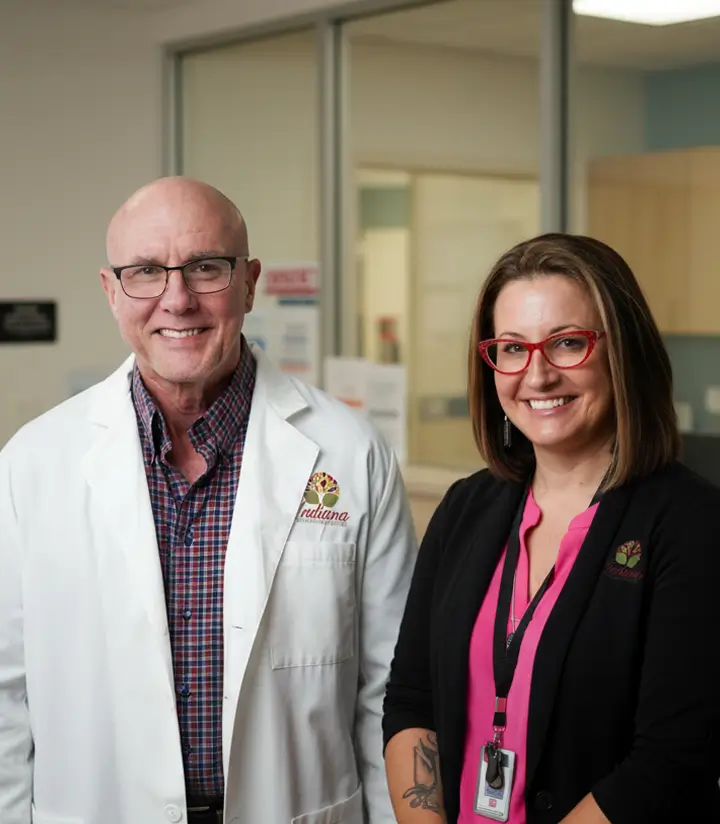
Is There Medication For Alcohol Addiction?
Clinically Reviewed by:
Medication for alcohol addiction helps people reduce cravings and manage withdrawal symptoms. These medications work in different ways: some block the effects of alcohol, others reduce cravings, and some alleviate withdrawal discomfort. These medications are often used alongside therapy and support groups to enhance recovery and promote long-term sobriety. Keep reading to learn more about medications for alcohol addiction.

Key Takeaways
FDA-approved medications like naltrexone and disulfiram are valuable tools for alcohol addiction recovery. Here’s what you need to know:
- Medications work by reducing cravings and creating unpleasant reactions to alcohol.
- Understanding the biology of alcohol use disorder (AUD) helps develop targeted interventions and medications.
- Different treatment options and ongoing support through aftercare programs are crucial for sustained recovery.
Indiana Center for Recovery offers addiction treatment for a sober life. Reserve your spot today by calling (844) 650-0064.
Biology of Alcohol Addiction
Alcohol use disorder (AUD) stems from complex biological interactions in the body. Consuming alcohol affects the brain’s opioid receptors, triggering a cascade of responses that contribute to AUD. The number of drinks consumed and the frequency of alcohol use intensify these effects. Unhealthy alcohol use disrupts the body’s natural balance, leading to a strong desire to continue drinking despite negative consequences.
The complex chemical imbalance between neurotransmitters and brain regions reinforces the cycle of addiction. Understanding the biology behind AUD is crucial for the use of suitable medications and interventions to address the underlying mechanisms of this challenging condition.
Signs and Symptoms of Alcohol Use Disorder
Alcohol Use Disorder is diagnosed when an individual exhibits problematic alcohol use. They may show signs of tolerance and withdrawal symptoms. Some individuals also undergo unsuccessful attempts to quit and spend increased time drinking. The signs of alcoholism include:
- Tolerance: Heavy drinking or needing more alcohol to achieve the same effects.
- Withdrawal: Experiencing physical or emotional symptoms when not drinking.
- Neglecting Responsibilities: Failing in duties at work, home, or socially due to alcohol use.
- Continued Use Despite Consequences: Persistent drinking despite adverse effects on health or relationships.
- Time Spent Drinking: Devoting significant time to obtaining, using, or recovering from alcohol.
- Loss of Interest: Decreased interest in activities once enjoyed.
- Major health problems: Experiencing stomach aches and liver problems may lead to serious heart problems.
Alcohol dependence can lead to severe AUD, impacting mental health and potentially causing liver damage. Seeking help from a primary care doctor, discussing medication options, and addressing underlying mental illness are essential steps in managing Alcohol Use Disorder.
FDA-Approved Medications for Alcohol Addiction
FDA-approved medications play a pivotal role in the medical treatment of Alcohol Use Disorder (AUD). These medications, prescribed by healthcare professionals, aid patients in overcoming alcohol addiction.
Naltrexone
Naltrexone is an FDA-approved medicine for alcohol addiction, assisting patients in their journey toward recovery. It works by blocking opioid receptors, reducing the rewarding effects of alcoholic drinks.
This medication helps control alcohol cravings, making it a valuable tool in the medication management of AUD. When combined with counseling, naltrexone is a vital and beneficial tool in achieving lasting recovery.
Acamprosate
Acamprosate medication, sold under the brand name Campral, supports the treatment of Alcohol Use Disorder by stabilizing the chemical balance in the brain. It reduces the desire for alcoholic drinks and is particularly beneficial for individuals striving to maintain abstinence.
As part of a medical treatment plan, acamprosate, when prescribed by healthcare professionals, aids patients in overcoming AUD. Its positive impact on promoting sobriety and minimizing the risk of relapse underscores its significance in effective treatment strategies.
Disulfiram
Disulfiram, a medication approved by the FDA, discourages alcohol consumption by inducing unpleasant side effects when combined with alcoholic drinks. This unique approach serves as a deterrent, discouraging patients from drinking. Healthcare professionals carefully consider individual medical conditions and the potential for side effects when prescribing disulfiram.
Topiramate
Topiramate is a medication that, in addition to its use for seizures and nerve pain, has shown promise in alcohol treatment. It helps by influencing brain chemicals and reducing cravings and withdrawal symptoms associated with alcohol.
By adjusting neurotransmitter activity, topiramate aids in managing alcohol dependence. However, it’s crucial to use this medication only under a healthcare professional’s guidance, following prescribed doses to ensure safety and effectiveness in alcohol treatment.
Gabapentin
Gabapentin, primarily used for seizures and nerve pain, has demonstrated efficacy in alcohol treatment. By affecting neurotransmitters in the brain, it helps manage cravings and withdrawal symptoms associated with alcohol dependence.
The use of gabapentin for alcohol treatment should be under the supervision of a healthcare professional. They ensure adherence to prescribed doses and monitor for potential side effects to optimize their effectiveness in supporting recovery.
How Medications Work to Treat Alcohol Dependence
Medications help treat alcohol dependence by working in various ways.
These medications target specific receptors and pathways associated with the brain’s reward system, helping to modify the reinforcing effects of alcohol. They can either mimic the effects of neurotransmitters to reduce cravings or block certain receptors to decrease the pleasurable sensations associated with alcohol consumption.
Additionally, some medications work to alleviate withdrawal symptoms, making detoxification more manageable. Understanding how these pills work supports individuals on their journey to recovery, offering a targeted and effective approach to managing alcohol dependence.
Considerations When Using Medication
If you have a serious medical condition like a liver condition or engage in heavy alcohol use, seek medical advice. Always talk to your healthcare provider about your situation to find the right treatment.
Possible Side-Effects
Medications for alcohol addiction can have side effects. Some might cause allergic reactions, like rash or chest pain. Common side effects include nausea, stomach ache, vomiting, or diarrhea. Some people may experience drowsiness, dizziness, or headaches, affecting their coordination.
Individuals may also experience sleep problems, ranging from insomnia to excessive sleepiness. Changes in appetite and weight, as well as mood swings or irritability, can be potential side effects. Talk to your healthcare provider if you notice anything unusual.
Interaction Between Alcohol And Medications
Alcohol can negatively interact with medications used to overcome addiction. It’s crucial to understand how they interact and can cause serious health issues such as liver failure. If you’re on medication and still drinking, it could affect how well the medicine works.
This interaction can be risky, especially for those with liver disease. Before taking medications, it is best to inform your healthcare providers about the intensity of your drinking habits to make sure your prescription dosage is appropriate for recovery. Remember, seeking medical advice ensures a smoother journey toward overcoming alcohol addiction.
Suitable Dosage of Medications
Using medications for alcohol addiction should always be done under the guidance of a healthcare professional. It’s important to follow the prescribed dosage and schedule. Inform your doctor about other pills you take for certain health conditions to avoid interactions.
Regular check-ups are crucial to monitor progress and address concerns. Open communication about any side effects ensures a safe and effective treatment. Remember, medication use is most effective when combined with counseling and support as part of a comprehensive approach to alcohol addiction treatment.
Frequently Asked Questions (FAQ)
What is the best medicine for avoiding alcohol?
The best medicine for avoiding alcohol depends on individual needs. Naltrexone, studied in clinical trials, is one option. It works by reducing the desire for alcohol, making it a helpful choice for many. However, talking to a healthcare provider before starting any medication is essential. They can guide you, considering possible allergic reactions, and help you take the first step towards effective treatment for alcohol avoidance.
Is it true that I can use Ozempic for alcohol use disorder?
Ozempic is not typically used for alcohol use disorder. It is primarily prescribed for managing certain health conditions like diabetes. If you are struggling with alcohol use disorder, it’s crucial to discuss appropriate treatments with a healthcare professional. Using medications not intended for this purpose may not be effective and could lead to unwanted side effects.
Is there any medicinal cure for alcohol addiction?
While there is no outright cure for alcohol addiction, several medications approved by the Food and Drug Administration (FDA) can aid in treatment. Naltrexone, acamprosate, and disulfiram are examples of medications prescribed by healthcare providers to assist individuals in managing alcohol use disorder. These medications, along with counseling and support, form part of comprehensive treatment options, helping individuals on their path to recovery.
Beat Alcohol Addiction with the Indiana Center for Recovery
Medications like naltrexone, acamprosate, and disulfiram can reduce alcohol cravings and support recovery when combined with therapy. If you’re considering medication-assisted treatment for alcohol use disorder or want to discuss options, Indiana Center for Recovery provides evidence-based care with medical supervision to help you choose the right approach.
When stopping drinking requires medical help, our supervised alcohol detox program gives you medical support around the clock to safely manage withdrawal and prevent complications.
After your body has stabilized, our alcohol addiction treatment includes medication-assisted treatment options combined with therapy and relapse prevention planning to help you maintain sobriety. For those who would benefit from around-the-clock care, our residential alcohol rehab program provides round-the-clock support in a therapeutic environment designed for recovery.
Find help near you at rehab centers across Indiana. Call (844) 650-0064 to discuss medication-assisted treatment options for alcohol use disorder today.






 100% Confidential
100% Confidential
